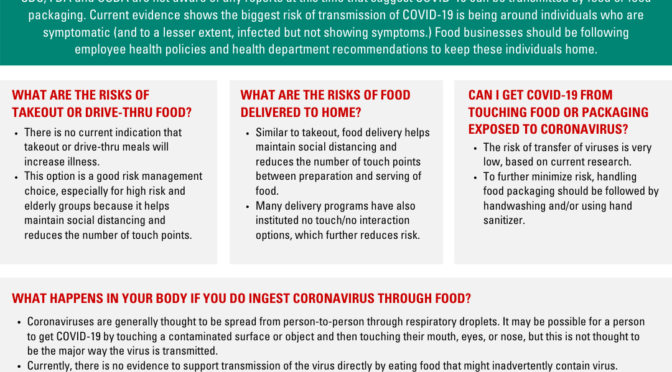These are scary times, and a lot of us are worried about whether it’s safe to eat takeout or delivery food. This chart from NC State Extension at North Carolina State University offers a thoughtful – and generally reassuring – overview.
COVID-19 and food safety FAQ
Is coronavirus a concern with takeout?
CDC, FDA, and USDA are not aware of any reports at this time that suggest Covid-19 can be transmitted by food or food packaging. Current evidence shows the biggest risk of transmission of Covid-19 is being around individuals who are symptomatic (and to a lesser extent, infected but not showing symptoms.) Food businesses should be following employee health policies And health department recommendations to keep these individuals home.
What are the risks of takeout or drive-through food?
* There is no current indication that takeout or drive-through meals will increase illness.
* This option is a good risk management choice especially for high risk and elderly groups because it helps maintain social distancing and reduces the number of touch points.
What are the risks of food delivered to home?
* Similar to takeout food delivery helps maintain social distancing and reduces the number of touch points between preparation and serving of food.
* Many delivery programs have also instituted no touch/no interaction options, which further reduce his risk.
Can I get COVID-19 from touching food or packaging exposed to coronavirus?
* The risk of transfer of viruses is very low based on current research.
* To further minimize risk handling food packaging should be followed by handwashing and/or using hand sanitizer.
What happens in your body if you do ingest coronavirus through food?
* Coronaviruses are generally thought to be spread from person to person through a respiratory droplets. It may be possible for a person to get Covid-19 by touching a contaminated surface or object and then touching their mouth eyes or nose, but this is not thought to be the major way of the virus is transmitted.
* Currently there is no evidence to support transmission of the virus directly by eating food that might inadvertently contain virus.
* In commercial food production, processing, and preparation, there are many best practices that are routinely followed as per federal, state, and local regulations. These are all designed to prevent foods from becoming contaminated with microbes from the environment, including viruses.
* The best thing a consumer can do is to continue using good food safety practices before preparing or eating food like always washing your hands with soap and water for 20 seconds after using the restroom, and after blowing your nose, coughing, or sneezing.
From NC State extension – NC State University
Stay informed: foodsafety.ces.ncsu.edu/covid-19-resources
Updated March 23, 2020




